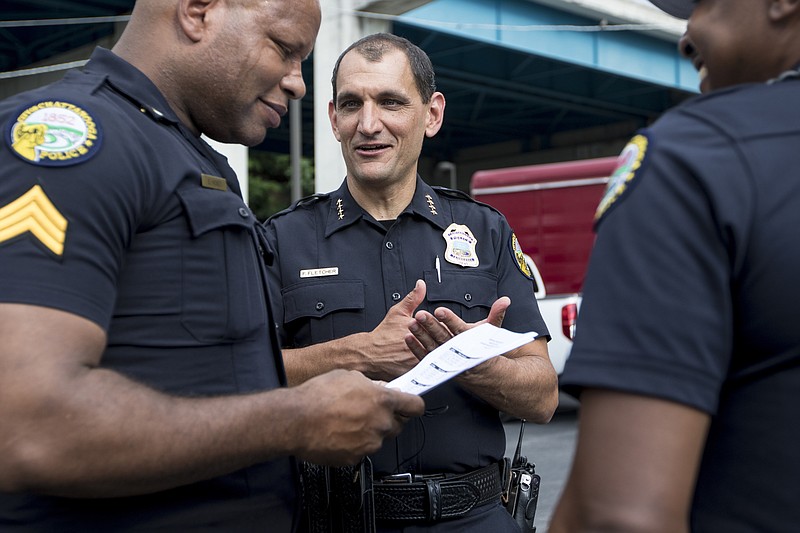Chattanooga Police Chief Fred Fletcher is aiming to launch a program to recruit more minority police officers.
He wants to raise money to pay people $500 incentives for recommending minority police cadets.
"People are motivated by financial incentive," Fletcher said. "So I thought, 'Why over-complicate it?' Let's just pay people who can help us meet our goal, which is to increase diversity."
The Chattanooga Police Department has 457 sworn officers. Most of them (77.7 percent) are white and male (92.8 percent), according to the department's latest demographics.
Blacks now represent 17.3 percent of sworn officers, Hispanics represent 3.5 percent, American Indians 1.1 percent and Asians 0.40 percent.
Fletcher said the police force is so far from reflecting the city's demographics he expects it will take years to reach that goal. According to the latest U.S. Census figures, women account for 52 percent of Chattanooga's population. Blacks account for 35 percent, Latinos 6 percent and Asians 2 percent.
Local Nation of Islam Leader Kevin Muhammad said the recommendation incentives won't make a difference because "the problems within the police department go deeper than $500."
More minorities don't join the force because of distrust, and many blacks already on the force don't advance, Muhammad said.
But City Councilman Moses Freeman, who supports Fletcher's effort, committed $500 himself to help get the effort started. Fletcher also is applying for grants and appealing to local nonprofit organizations.
"We're trying everything," Freeman said. "We've got to get the number of African-American police up significantly, and I think this is a great way to do it."
Having more Latino officers would help overcome language barriers within the Latino community, said Stacy Johnson, executive director of assistance agency La Paz.
"Businesses and organizations need to mirror the people that they serve," she said.
Instead of taking the traditional route of running radio and TV public service announcements and posting advertisements on billboards, Fletcher plans to rely on person-to-person recommendations for police academy candidates.
He hopes to launch the recruitment program, called Each One Reach One, this summer.
The city's legal and human resources personnel have given to OK to proceed with the program, Fletcher said.
Even if a person isn't successful in motivating a potential cadet to apply, he said, the advocate still would have had a positive conversation about the police department. That could improve public relations, the chief said.
Fletcher said he took the Each One Reach One name from a philosophy Sector 3 zone commander Capt. Edwin McPherson cites when mentoring younger officers.
The police chief said he started meeting with organizations like the NAACP and the Urban League in 2015 to gain public support and form collaborations for the recruitment program. He also met with Chattanooga State Community College's Gladys Pineda-Loher, the school's director of international community outreach.
Capt. Kim Noorbergen, the department's special operations captain over training and recruiting, said that within the past year the department made changes geared toward getting more diverse people interested in the police force. Those changes included no longer requiring a woman to do pull-ups to become a cadet.
Also within the past year, the police department started offering training sessions before each academy so potential cadets would know what to expect.
Freeman said having a police force with demographics reflective of the population would mean the black community would look with less suspicion on the department.
"We're behind the curve, so even if we recruit a class of cadets that represents the community demographically it would take decades to catch up," Fletcher said. "So we obviously want to over-represent the [minority] community in coming cadet classes so that we can make up ground that our predecessors lost."
Contact staff writer Yolanda Putman at yputman@timesfree press.com or 423-757-6431.
